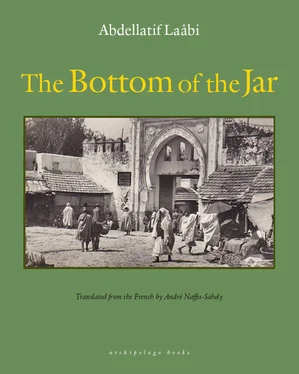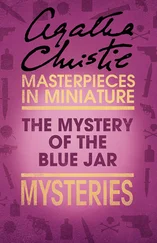Hear me, oh girls
They say Mikou’s dead
That a donkey bit him
And that’s why he’s dead.
Why did he address his song specifically to girls? Which Mikou was he singing about? Nobody asked themselves these sorts of questions. The song became a real hit among the children, who added it to their repertoire.
THERE WAS ANOTHER way in which Mikou was looked after in the neighborhood. Even though he was able-bodied and in the prime of life, he was the only man who could mingle among women in their homes. The men looked on this as normal and the women were delighted with his presence. They could go around unveiled and adopt a casual air with someone unrelated to them. A game that seemed to excite them. They didn’t hesitate to tease him about “below the belt” subjects, and poor Mikou, who had taken a vow of chastity, would blush a bright red right up to his ears.
Hear me, oh girls
They say Mikou’s dead. .
Namouss tried to wrap his head around it. Mikou was a man, and yet he wasn’t a man. Maybe he was a child that had grown up too quickly. And what about him — who never stopped mulling things over — was an adult trapped inside a child’s body?
WITH THESE QUESTIONS planted firmly in his mind, Namouss began making his rounds. On the right-hand side at the bottom of the street, in a place called Small Springs, there was a row of fine-leathers craftsmen, where he knew he would be able to observe another character in action. Unlike Mikou, whose renown did not extend beyond the neighborhood, this particular character, a woman, was known throughout the whole city. Her nickname Chiki Laqraâ (the bald spook) suited her well. Her skin was a shade whiter than most, while her head was almost completely bald, save for a few henna-colored tufts protruding from her forehead. This, coupled with the fact that she wore a simple dress and went about unveiled, meant she had everything she needed to draw attention to herself. It was during the afternoon, at rush hour, that she began to work. She would go from neighborhood to neighborhood, stopping in places where she was guaranteed to harangue the maximum number of people. Small Springs was one of her favorite haunts.
Her ranting had already begun by the time Namouss arrived. Hands on hips, head thrown back, eyes bulging, she was cursing and threatening an invisible enemy, sometimes even directing her booming voice at nearby shopkeepers and bystanders. The filthy language she used and her tone was not too dissimilar from Ghita’s litanies. Yet Chiki Laqraâ was clearly going much further. Moreover, while there was a coherent thread running through Ghita’s ideas, Chiki was instead a devotee of the art of the non sequitur. Whenever the subject of sex arose, she accompanied her words with gestures, whereas those sorts of words only came out of Ghita’s mouth inadvertently. How many times had Namouss overheard his mother shout “. . allocks !” 5whenever she blurted out something inappropriate.
Chiki was shouting herself hoarse in front of her dumbfounded audience.
“Who does that son of a bitch take me for? I am a woman, and the daughter of an honorable woman. My head is bare and I have nothing to hide. Let him come near me and I’ll show him which hole the fish piss out of. She’s got her eyes on him, that man. There ya go! I hope she gets hold of him and drags him down into the dankest depths of the planet. What good can come of man? He claims to act according to the laws of reason while his mind is actually governed by his balls. You’re keeping quiet, eh, you riffraff! I’m just something else for you to watch. Very well then, I’ll show you the henna on my hands. Look here” — lifting the hem of her dress and rocking her pelvis forward — “feast your eyes on that, and may you go blind! But you’re already blind to everything except the shine of gold. You eat what rightfully belongs to the orphans. You prize worthless coins above the lives of these innocents. Oh your hearts are made of stone! And that’s all you’ll be taking with you into the afterlife. In the meanwhile, try and stop me from speaking my mind, I dare you. Have me locked up in the Sidi Frej asylum. I don’t know who is the craziest one among us. The maddest one is she who has been cursed by her parents. That twat of a mother of mine, she thinks she’s got one over on me. She doesn’t know who Chiki is. Those who don’t know Chiki better watch out! Her curse is deadly. I am the black hen that will hound you until the day of Resurrection.”
Despite her threats and harsh accusations, some kind souls would slip a small coin into Chiki’s hand, who, suddenly appeased, would smile and respond to their generosity.
“They are nothing but sons of bitches. Bless you my children.”
Then she would leave the place, followed by a swarm of children.
Slightly stunned by her speech, Namouss decided to join the crowd. He took a left and headed toward Nejjarine Square, where another spectacle lay in store for him. The man who presided over this ceremony was also there and had chosen a good spot. Nejjarine Square was the intersection of three particularly busy souks: that of the carpenters, which gave its name to the square; that of the saddlers, where Driss had his shop; and finally that of the potters. Not to mention the fountain in the middle of the square, where nearby residents came to fetch their water.
They called him Bou Tsabihate (rosary man), and he was certainly covered in rosaries. He wore many around his neck, which dangled down his large chest. Others were strung around his arms, which he always kept outstretched before beginning to preach his sermon. He was magnificent. Slender, with a strong constitution. A thick beard framing the entirety of his face. His head covered by a yellow turban, impeccably fitted.
Namouss had heard contradictory reports about the man. Some took him for a madman of God, or in other words, a saint. Others suspected him of being a proponent of a religious sect in cahoots with the colonial authorities. That he had chosen to preach in Nejjarine Square where there was a police station lent authority to the second theory. Could everything he was shouting so vehemently be genuine considering there was an abundance of attentive ears waiting to catch him out?
Namouss didn’t know what to think. As it happens, he became indifferent to all this reasoning when Bou Tsabihate raised his voice and launched into his homily, making even all the unbelievers fall silent.
“Come back to God, oh slaves of God! Don’t allow yourselves to be corrupted by this fleeting world. It’s just another one of Satan’s tricks, since he loves nothing better than pissing in your ear and diverting you from the path of righteousness. Faith and prayer are the only remedy. But what is that I see? The mosques empty when it’s time to fill your stomachs. You are still snoring when the muezzin calls you to your duty. And what about orphans, what do you do for them? And what do you spare for beggars save crumbs and bones? And what about the hajj, how many among you hoarders of gold and silver have carried it out? Oh black sheep, you have been led astray, crossed into the land of the Pharaohs. Your children pay you in kind by forsaking all notions of decency and obedience. I say to you, the end of the world draws near. The goblins will soon come. They will come out of the basin in Moulay Idriss. Mules will conceive and give birth. The deluge will drown you. You will pay dearly for your sins when you stand naked before your Lord. Eternal hell will be your punishment. Come back to God, oh slaves of God!”
Unlike Chiki Laqraâ, Bou Tsabihate never begged for alms. Once his sermon was finished, he would vanish into the unknown, while the people who had gathered to listen would also disperse, with grave looks on their faces. The nearby craftsmen went back to work, with equally grave expressions.
Читать дальше












